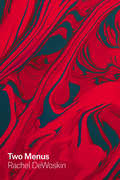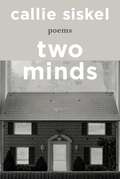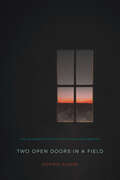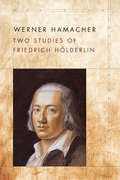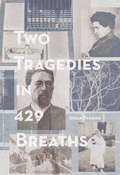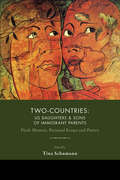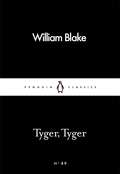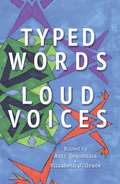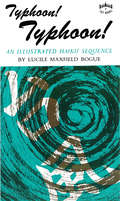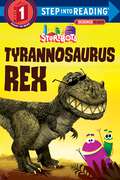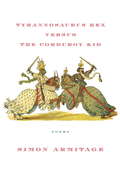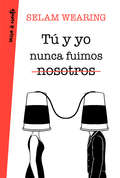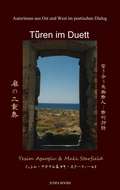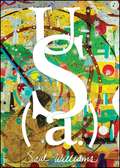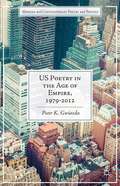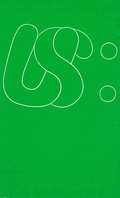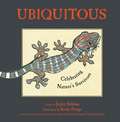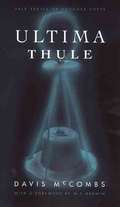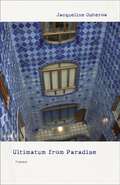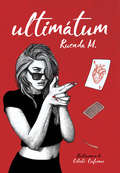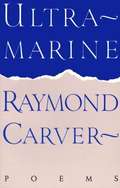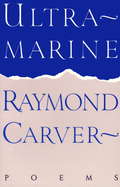- Table View
- List View
Two Menus (Phoenix Poets)
by Rachel DeWoskinThere are two menus in a Beijing restaurant, Rachel DeWoskin writes in the title poem, “the first of excess, / second, scarcity.” DeWoskin invites us into moments shaped by dualities, into spaces bordered by the language of her family (English) and that of her new country (Chinese), as well as the liminal spaces between youth and adulthood, safety and danger, humor and sorrow. This collection works by building and demolishing boundaries and binaries, sliding between their edges in movements that take us from the familiar to the strange and put us face-to-face with our assumptions and confusions. Through these complex and interwoven poems, we see how a self is never singular. Rather, it is made up of shifting—and sometimes colliding—parts. DeWoskin crosses back and forth, across languages and nations, between the divided parts in each of us, tracing overlaps and divergences. The limits and triumphs of translation, the slipperiness of relationships, and movements through land and language rise and fall together. The poems in Two Menus offer insights into the layers of what it means to be human, to reconcile living as multiple selves. DeWoskin dives into the uncertain spaces, showing us how a life lived between walls is murky, strange, and immensely human. These poems ask us how to communicate across the boundaries that threaten to divide us, to measure and close the distance between who we are, were, and want to be.
Two Minds: Poems
by Callie SiskelIn a piercing and beautiful elegy for the poet’s father, this debut volume investigates the enduring pain and transformative potential of grief. Does loss define us, or do we define loss? Tracing the duality of grief as it reverberates through a family, Callie Siskel wrestles with questions of identity and inheritance in precise, lucid poetry. Two Minds indulges and therefore exposes the vanity of turning private pain into art and the pursuit of self-revelation. Drawing on ekphrasis, ars poetica, and the prose poem, Siskel expands the elegiac genre as she oscillates between childhood and adulthood, art and mythology, as well as the natural and domestic world. At once cerebral and emotional, Two Minds is an essential meditation on the ways that loss cleaves and doubles our perceptive power.
Two Open Doors in a Field (The Backwaters Prize in Poetry Honorable Mention)
by Sophie KlahrThe poems of Two Open Doors in a Field are constructed through deliberate limitations, restlessly exploring place, desire, and spirituality. A profusion of sonnets rises from a single circumstance: Sophie Klahr&’s experience of driving thousands of miles alone while listening to the radio, where unexpected landscapes make listening to the unexpected more acute. Accompanied by the radio, Klahr&’s experience of land is transformed by listening, and conversely, the body of the radio is sometimes lost to the body of the land. The love story at the core of this work, Klahr&’s bond with Nebraska, becomes the engine of this travelogue. However far the poems range beyond Nebraska, they are tethered to an environment of work and creation, a place of dirt beneath the nails where one can see every star and feel, acutely, the complexity of connection.
Two Studies of Friedrich Hölderlin (Meridian: Crossing Aesthetics)
by Werner HamacherTwo Studies of Friedrich Hölderlin shows how the poet enacts a radical theory of meaning that culminates in a unique and still groundbreaking concept of revolution, one that begins with a revolutionary understanding of language. The product of an intense engagement with both Walter Benjamin and Jacques Derrida, the book presents Werner Hamacher's major attempts at developing a critical practice commensurate with the immensity of Hölderlin's late writings. These essays offer an incisive and innovative combination of critical theory and deconstruction while also identifying where influential critics like Heidegger fail to do justice to the poet's astonishing radicality. Readers will not only come away with a new appreciation of Hölderlin's poetic and political-theoretical achievements but will also discover the motivating force behind Hamacher's own achievements as a literary scholar and political theorist. An introduction by Julia Ng and an afterword by Peter Fenves provide further information about these studies and the academic and theoretical context in which they were composed.
Two Tragedies in 429 Breaths
by Susan PaddonTwo Tragedies in 429 Breaths is a book-length series of poems written from the perspective of a daughter who reads Chekhov obsessively while spending a spring and summer caring for her mother, who is dying from pulmonary fibrosis. Through the prism of the relationships in Chekho's work and life emerges an honest, intimate, and even occasionally humorous portrayal of the energy we put into each other's lives during times of deterioration and suffering.
Two for Stew
by Barney Saltzberg Laura Joffe Numeroff"Stew for two" seems like such a simple request, but in this wacky restaurant romp, that order is anything but simple. A busload of tourists from Spain ate up every drop; and so a woman, her poodle, and the waiter set out on a quest for that chunky yet creamy, ever so dreamy, world-famous stew. There's nothing these two hungry customers like better -- except perhaps just one thing. . . . Along the way to becoming a bestselling children's book writer and illustrator, Laura Numroff walked dogs, worked at a jazz radio station, and ran a carousel. She is best known for her popular books "If You Give a Mouse a Cookie" and "If You Give a Moose a Muffin. " Ms. Numeroff lives in Los Angeles. A writer and illustrator with more than a dozen children's books to his credit, Barney Saltzberg is also a composer of music for children. His original songs, such as "Where, Oh, Where's My Underwear?," show the same delightful humor that inspires "Two for Stew. " A native Californian, Mr. Saltzberg was born and raised in Los Angeles, where he lives with his wife and two children.
Two-Countries: US Daughters & Sons of Immigrant Parents: Flash Memoir, Personal Essays and Poetry
by Tina SchumannThe IPPY Award–winning anthology of poetry, memoir, and essays—&“accounts of assimilation and nostalgia, celebration and resistance&” (Rick Barot, author of The Galleons). This collection contains contributions from sixty-five writers who were either born and/or raised in the United States by one or more immigrant parent. Their work describes the many contradictions, discoveries and life lessons one experiences when one is neither seen as fully American nor fully foreign. Contributors include Richard Blanco, Tina Chang, Joseph Lagaspi, Li-Young Lee, Timothy Liu, Naomi Shihab Nye, Oliver de la Paz, Ira Sukrungruang, Ocean Vuong, and many other talented writers from throughout the United States. Winner of a Bronze Medal from the Independent Publisher Book Awards for Multicultural Nonfiction &“When you hold in your DNA two countries—the cultures, the languages, the delicious foods and stories—you embody richness. These writers know on the cellular level many-layered ways to live, to struggle, to love. Here are voices we need to hear, writers we need to read. This is a brilliant, timely book, an antidote to divisiveness.&” —Peggy Shumaker, former Alaska State Writer Laureate &“The poets and writers in Two-Countries show that one result of our ongoing national experiment is a rich deepening in our literature. We may be in perilous times as a country, but our writers have never been in more ferocious health.&” —Rick Barot, author of The Galleons
Tyger, Tyger (Penguin Little Black Classics)
by William Blake'How can the bird that is born for joy / Sit in a cage and sing?'A selection of Blake's most haunting verse, including 'The Songs of Innocence and Experience'.One of 46 new books in the bestselling Little Black Classics series, to celebrate the first ever Penguin Classic in 1946. Each book gives readers a taste of the Classics' huge range and diversity, with works from around the world and across the centuries - including fables, decadence, heartbreak, tall tales, satire, ghosts, battles and elephants.
Typed Words, Loud Voices
by Various"I'd like coffee, please." "No. I don't believe you. How do I know it is really you who wants coffee and not your friend there subliminally transmitting that to you by touching your shoulder?" Imagine a world where you had to prove you knew your own mind even to get a cup of coffee, where it was generally assumed that you could have no thoughts of your own, so if you did express your thoughts, it must be some trick. What would you do? Would you give up, or demand to be heard? Sadly, this world is not imaginary for many of the writers in this book, who have chosen the path of demanding to be heard. Their best (and sometimes only) mode of communication is sometimes called "discredited" because it was "tested" in ways that make no sense. <p><p> Typed Words, Loud Voices is written by a coalition of writers who type to talk and believe it is neither logical nor fair that some people should be expected to prove themselves every time they have something to say. Read our arguments and hear us. Help us change the world.
Typhoon! Typhoon!: An Illustrated Haiku Sequence
by Lucile Maxfield BogueThis collection of haiku poetry by a western poet is a wonderful contribution to the world of Japanese poetry.Alone in a tiny house in the Japanese countryside, Lucile Bogue awoke one night to experience her first typhoon. <P><P>With the house shaking and rattling, the wind howling, and the rain pouring down in torrents, she was afraid for the first time in her life. That same night, by the light of a candle, she wrote these haiku poems. The morning brought calm and a brilliant sun to greet her. Each poem is accompanied by one of the author's delicate sumi-e style illustrations with calligraphy by Keiko Hata.
Tyrannosaurus Rex (Step into Reading)
by StorybotsThe wacky robots from the award-winning apps, videos, and Netflix show, Ask the Storybots, now star in their own early readers. This one is about everyone&’s favorite dinosaur!Fans of the StoryBots will recognize the colorful art from the hugely popular dinosaur video &“Tyrannosaurus Rex&” on YouTube. A gigantic body and super-sharp teeth make the Tyrannosaurus rex the most fearsome of the dinosaurs. Just don&’t make fun of those tiny arms! This rhyming Step 1 Science Reader will entertain while imparting simple facts about the most popular carnivorous dinosaur of all. Step 1 Readers feature big type and easy words for children who know the alphabet and are eager to begin reading. Rhyme and rhythmic text paired with picture clues help children decode the story. Accolades for the StoryBots digital media: Appy Award for Best Book AppTeacher's Choice Award Editor&’s Choice—Children&’s Technology Review Family Choice Award Parents&’ Choice AwardCynopsis Kids !magination Award for best educational mobile app
Tyrannosaurus Rex Versus the Corduroy Kid
by Simon ArmitageFrom one of the most important British poets at work today comes a brilliant new collection that meditates on human battles past and present, on youth and age, on monsters and underdogs, on the life of nations and the individual heart.In Tyrannosaurus Rex Versus the Corduroy Kid, we meet a writer who speaks naturally, and with frankness and restraint, for his culture. Armitage witnesses the pathos of women at work in the mock-Tudor Merrie England coffeehouses and gives us a backstage take on the world of Oliver Twist and the Artful Dodger. He makes a gift to the reader of the sympathy and misery and grit buried in his nation's collective consciousness: in the distant battle depicted in the Bayeux Tapestry and in the daily lives and petty crimes of ordinary people. In poems that are sometimes lyrical, sometimes brash and comic, and full of living voices, the extraordinary and the mythic grow out of the ordinary, and figures of diminishment and tragedy shine forth as mysterious, uncelebrated exemplars. Armitage tells us ruefully that "the future was a beautiful place, once," and with a steady eye out for the odd mystery or joyous scrap of experience, examines our complex present instead.AFTER THE HURRICANESome storm that was, to shoulder-charge the wallin my old man's back yard and knock it flat.But the greenhouse is sound, the chapel of glasswe glazed one morning. We glazed with morning.And so is the hut. And so is the shed.We sit in the ruins and drink. He smokes. Back when, we would have built that wall again.But today it's enough to drink and smokeamongst mortar and bricks, here at the empire's end.From the Hardcover edition.
Tú y yo nunca fuimos nosotros
by Selam WearingSelam Wearing se revela con su primer poemario como uno de los grandes talentos literarios de su generación. Su poética está llena de ternura, sensualidad, humor, imágenes muy certeras y comunicativas que rozan la anécdota y que hacen evidente la influencia de la poesía de la experiencia, el realismo sucio o el neorrealismo en su imaginario. Esto no es otro libro de poemas, soy yo pidiendo auxilio, pero nadie me socorre. He asumido que nunca nos olvidaremos. Cada vez que nos cruzamos sus ojos se revelan ante mí, nostálgicos de todo aquello que no hemos sido, preguntándose acaso si aún no es demasiado tarde. Pero ninguno hace nada. Ella se muerde el labio y mira a cualquier otra parte con los pensamientos clavados en mí. Yo acelero el paso, como si llegara tarde a donde nadie me está esperando. Prologado por Roger Wolfe.
Türen im Duett: Autorinnen aus Ost und West im poetischen Dialog
by maki starfield/Yesim AgaogleEin literarischer Dialog zweier Schriftstellerinnen aus verschiedenen Kulturen und Kontinenten, die das gemeinsam und getrennt Erlebte in Worte bringen.
US (a.)
by Saul WilliamsIn his greatly anticipated new full-length book of poetry, the first since The Dead Emcee Scrolls in 2006, "the poet laureate of hip-hop" (CNN) Saul Williams presents his ideas, observations, realizations, dreams, and questions about the state of America, the American psyche, and what it means to be American.After four years abroad, Williams returned to the United States and found his head twirling with thoughts on race, class, gender, finance, freedom, guns, cooking shows, dog shows, superheroes, not-so-super politicians--everything that makes up our country. US(a.) is a collection of poems that embodies the spirit of a culture that questions sentiments and realities, embracing a cross-section of pop culture, hip-hop, and the greater world politic of the moment. Williams explores what social media may only hint at--times and realities have changed; there is a connect and a disconnect. We are wirelessly connected to a past and path to which we are chained. Saul Williams stops and frisks the moment, makes it empty its pockets, and chronicles what's inside. Here is an extraordinary book that will find its place in the hands and minds of a new generation.
US Poetry in the Age of Empire, 1979–2012
by Piotr K. GwiazdaExamining poetry by Robert Pinsky, Adrienne Rich, and Amiri Baraka, among others, this book shows that leading US poets since 1979 have performed the role of public intellectual through their poetic rhetoric. Gwiazda's argument aims to revitalize the role of poetry and its social value within an era of global politics.
US: Women
by Marjorie Fletcher"At its best, original, flat, urgent, the voice stays with us... an awkward, restless, honest presence, that won't sit down and talk, and won't go away."-Jean Valentine
Ubiquitous: Celebrating Nature's Survivors
by Joyce SidmanFrom the creators of the Caldecott Honor Book Song of the Water Boatman and Other Pond Poems...Ubiquitous(yoo-bik-wi-tuhs): Something that is (or seems to be) everywhere at the same time. Why is the beetle, born 265 million years ago, still with us today? (Because its wings mutated and hardened). How did the gecko survive 160 million years? (by becoming nocturnal and developing sticky toe pads.) How did the shark and the crow and the tiny ant survive millions and millions of years? When 99 percent of all life forms on earth have become extinct, why do some survive? And survive not just in one place, but in many places: in deserts, in ice, in lakes and puddles, inside houses and forest and farmland? Just how do they become ubiquitous?
Uju Lwezinkondlo: UEB Contracted
by N. A. Mahaye Z. E. SitholeUju Lwezinkondlo yi-antoloji eyiqoqo lezinkondlo ezibhalwe izimbongi ezehlukene. Yenzelwe ukusiza abafundi ukuba bafunde futhi baqonde ubunkondlo eBangeni le-12, Iqoqo libhalwe lagxiliswa ngokwezidingo zonke izidingo zohlelo lwemfundo i-CAPS. Uju Lwezinkondlo: • ihlelwe ngokomongo noma ingqikithi yezinhlobo zezinkondlo ukuze kubelula ukuqonda isakhiwo sezinkondlo • inomlandompilo wezimbongi ezikuleli qoqo lezinkondlo, ukwelekela abafundi ukuba bazi kabanzi ngempilo yezimbongi ukuze umsebenzi wezimbongi bawazi futhi bawuqonde kangcono • inencazelomagama (iglosari) etholakala ekugcineni kwebhuku, ukusiza umfundi ukuba aqonde amagama anqala obunkondlo asetshenziswe ngenkathi kuhlaziywa inkondlo ngayinye • inamanothi afundisayo ukusiza umfundi ukuba azi ukuthi inkondlo ihlaziywa kanjani ngokwemigomo yohlelo lwemfundo mayelana nokufundiswa kwezinkondlo ngokuphelele • inemibuzo nezimpendulo ukusiza umfundi ukuba azilolonge ngemibuzo, abheke futhi ezimpendulweni ukuthi bekumele aphendule kanjani, ngaleyo nabo akwazi ukuzimakela umsebenzi azenzela wona. Le antoloji yezinkondlo iwusizo olukhulu kumfundi osendleleni yokubhekana nezidingo zobunkondlo obunzulu kanye nokubhala izivivinyo ngempumelelo.
Uju Lwezinkondlo: UEB Uncontracted
by N. A. Mahaye Z. E. SitholeUju Lwezinkondlo yi-antoloji eyiqoqo lezinkondlo ezibhalwe izimbongi ezehlukene. Yenzelwe ukusiza abafundi ukuba bafunde futhi baqonde ubunkondlo eBangeni le-12, Iqoqo libhalwe lagxiliswa ngokwezidingo zonke izidingo zohlelo lwemfundo i-CAPS. Uju Lwezinkondlo: • ihlelwe ngokomongo noma ingqikithi yezinhlobo zezinkondlo ukuze kubelula ukuqonda isakhiwo sezinkondlo • inomlandompilo wezimbongi ezikuleli qoqo lezinkondlo, ukwelekela abafundi ukuba bazi kabanzi ngempilo yezimbongi ukuze umsebenzi wezimbongi bawazi futhi bawuqonde kangcono • inencazelomagama (iglosari) etholakala ekugcineni kwebhuku, ukusiza umfundi ukuba aqonde amagama anqala obunkondlo asetshenziswe ngenkathi kuhlaziywa inkondlo ngayinye • inamanothi afundisayo ukusiza umfundi ukuba azi ukuthi inkondlo ihlaziywa kanjani ngokwemigomo yohlelo lwemfundo mayelana nokufundiswa kwezinkondlo ngokuphelele • inemibuzo nezimpendulo ukusiza umfundi ukuba azilolonge ngemibuzo, abheke futhi ezimpendulweni ukuthi bekumele aphendule kanjani, ngaleyo nabo akwazi ukuzimakela umsebenzi azenzela wona. Le antoloji yezinkondlo iwusizo olukhulu kumfundi osendleleni yokubhekana nezidingo zobunkondlo obunzulu kanye nokubhala izivivinyo ngempumelelo.
Ultima Thule
by W. S. Merwin Davis Mccombs"The poems are set above and below the cave country of south central Kentucky, where McCombs lives. The book is framed by two sonnet sequences, the first about a slave guide and explorer at Mammoth Cave in the mid-1800s and the second about McCombs's experiences as a guide and park ranger there in the 1990s. Other poems deal with Mammoth Cave's four thousand year human history and the thrills of crawling into tight, rarely visited passageways to see what lies beyond. Often the poems search for oblique angles into personal experience, and the caves and the landscape they create form a personal geology.
Ultimatum from Paradise: Poems
by Jacqueline OsherowIn this collection, Jacqueline Osherow gives us perfectly formed, musical poems that glide between the worlds of art, architecture, literature, and religion. Traveling through Europe, Tel Aviv, and New York, Osherow observes with a keen eye the details of objects -- beautiful buildings and ancient artifacts -- and of the conversations and interactions she has with others. Finely constructed and always engaging, her poems uncover the startling truths of memory and coax our own forgotten moments from the recesses of the mind.
Ultimátum
by Ruenda M.Ruenda M. ha llegado a Montena y con él los versos más intensos y delicados. Ruenda hace una declaración de intenciones con cada uno de sus versos, su frases y sus fotografías. Sus textos tienen garra pero a la vez son delicados y generan la sensación de querer más. «Lo que tienes entre las manos, tan llenas de grietas como las mías, es un grito violeta; una revolución vestida de etiqueta, pero que sigue pidiendo limosna por las calles del querer. Esto es la capa más visible de un alma acostumbrada a huir del ruido para hacer eco en el papel.»
Ultramarine: Poems
by Raymond Carver"Mr. Carver is heir to that most appealing American poetic voice, the lyricism of Theodore Roethke and James Wright.... this book is a treasure, one to return to. No one's brevity is as rich, as complete, as Raymond Carver's." --New York Times Book Review. "Carver's gifts as a storyteller shine through his poetry.... Sometimes a Carver poem also works as a short story, with all its elements--character, diction, place, event--compressed intact into the brevity of verse. And sometimes Carver delivers the goods in pure lyrical form, in words as full of yearning and sensibility as those of a very young man, but poems possessing the hard-won qualities of focus, stillness and irony only rewarded by experience." --Los Angeles Times.
Ultramarine: Poems (Vintage Contemporaries)
by Raymond CarverOne of Raymond Carver&’s final collections of poetry, moving from the beauty of the natural world to thoughts of mortality and family and art. Throughout, Carver &“has the astonished, chastened voice of a person who has survived a wreck, as surprised that he had a life before it as that he has one afterward, willing to remember both sides&” (The New York Times Book Review).
